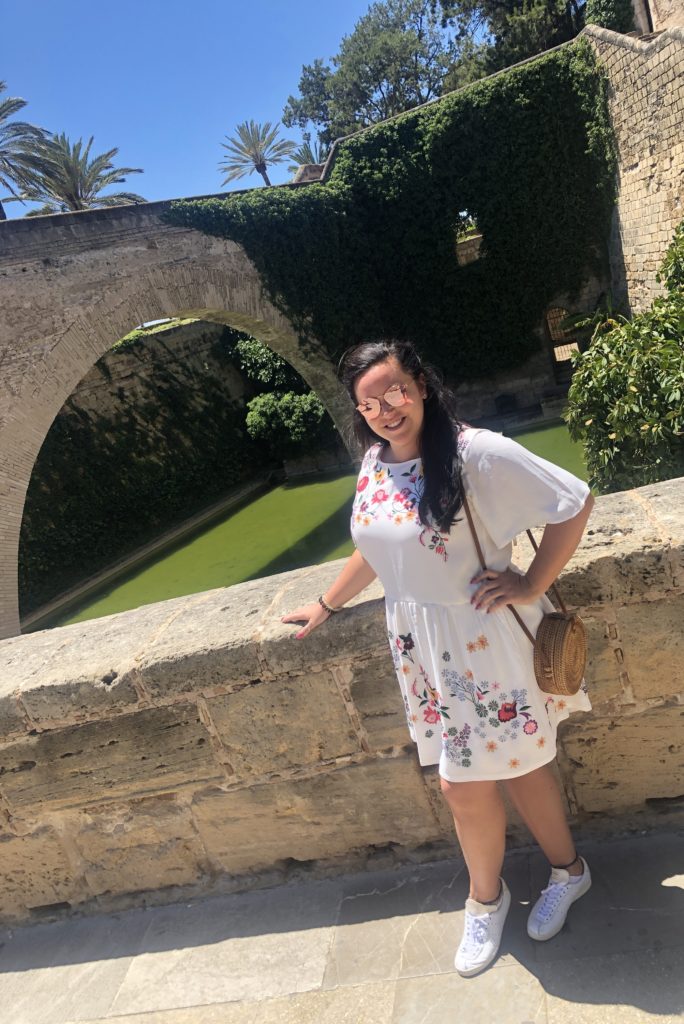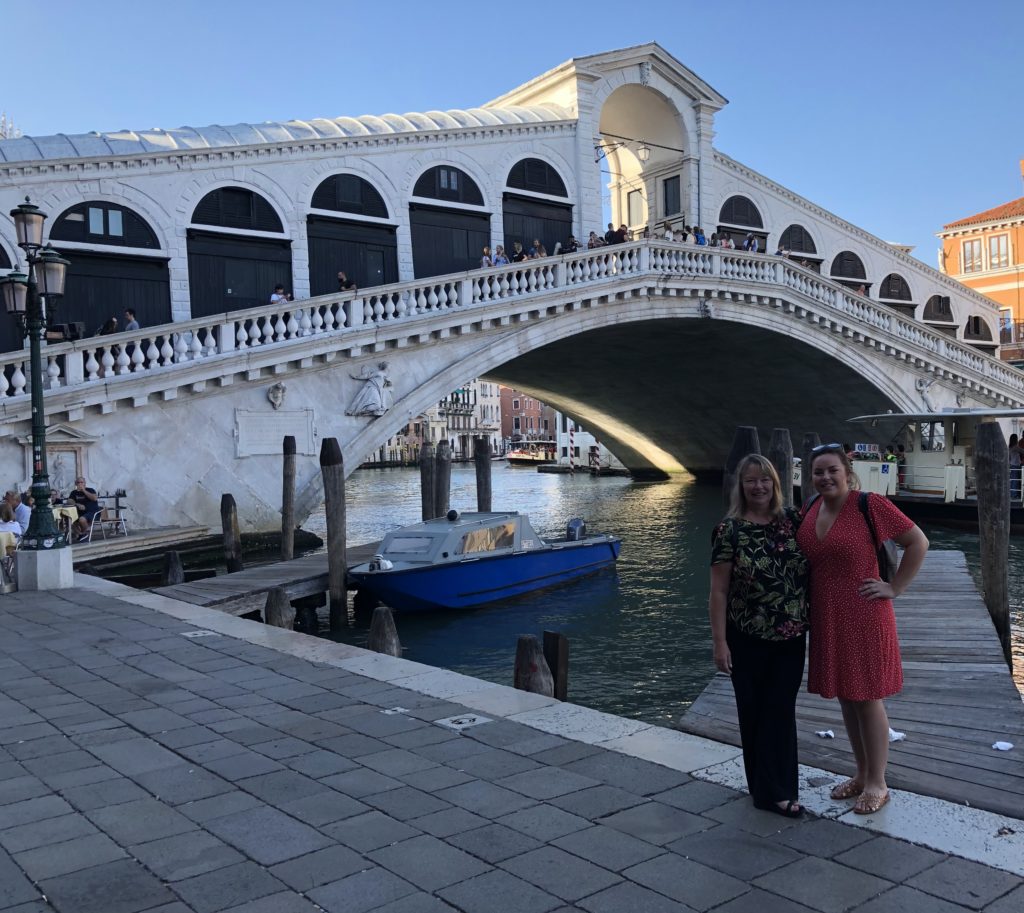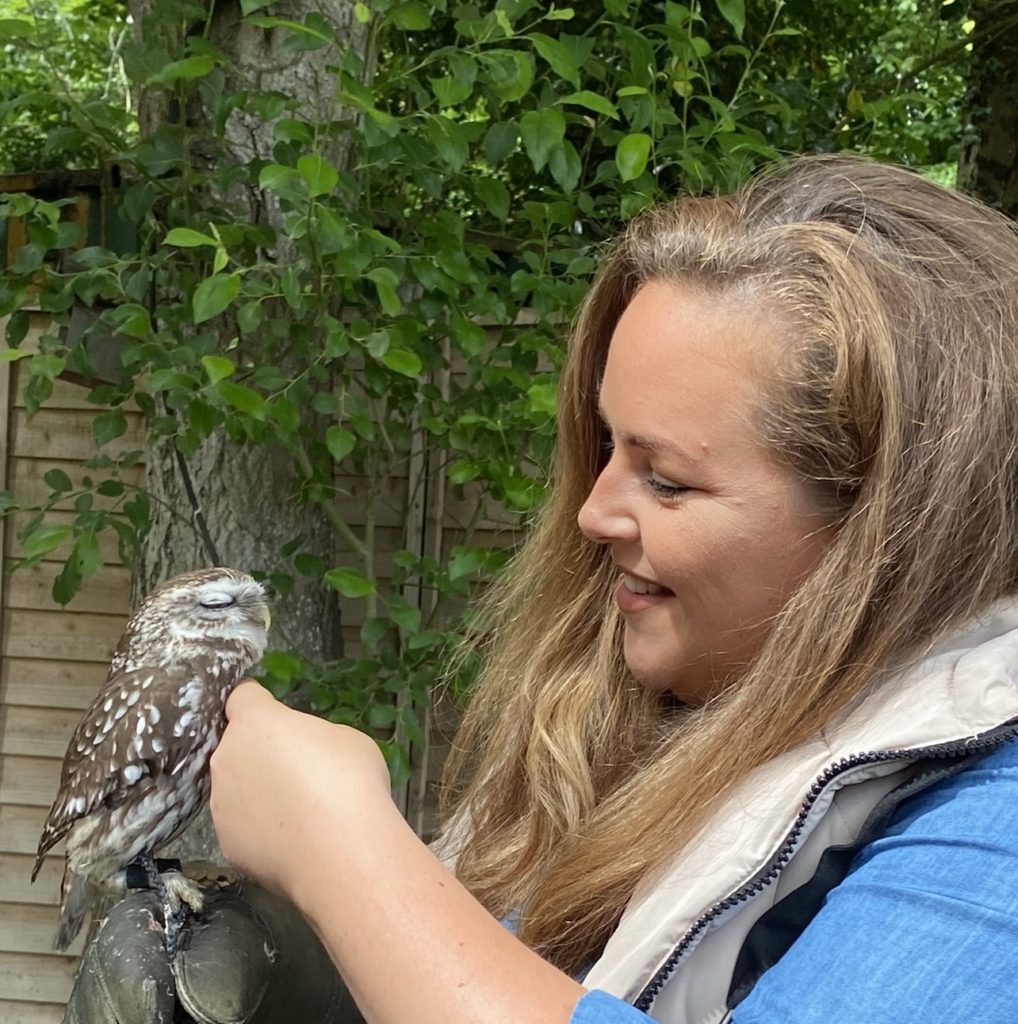Lauren
Next in the ‘Your Behçet’s Stories’ series, Lauren shared with us her journey to diagnosis, her experiences of the difficulties of getting treatment whilst living in Scotland, how she manages her Behçet’s alongside working full-time, and much more. Many thanks to Lauren for sharing your experiences with us.
We are looking for more participants for this series so if you would like to take part too, you’ll find the details at the bottom of the page.
Lauren is 34 years-old and lives alone in the central belt of Scotland. She works full-time from home in financial services for a large IT group. She is an animal lover, and her passion is to foster and rehabilitate small dogs who don’t need much exercise, but need a bit of love.
When did you first experience symptoms of Behçet’s and how did you get diagnosed?
Throughout my life I have suffered from all sorts of inflammatory issues including; IBS, GI reflux, anal fissures, vulvitis, acne vulgaris, boil-like lesions, folliculitis, gutate psoriasis (following viral illness) and migraines. As an active teenager, I had intermittent but significant pain in my joints, which was described as “growing pains” or attributed to horse riding. I had several bouts of severe tonsillitis and ulceration, until finally an ENT surgeon arranged to urgently remove my tonsils, noting it was one of the worst cases he had seen.
Mouth ulcers became frequent and ongoing alongside various skin issues. This all got more severe with age, increasingly impacting on my daily life. I was exhausted and was treated for low mood. Ulceration, joint pain and skin issues continued, and I simply got on with life, having my symptoms treated with; Roaccutane for acne, steroids, non-steroidal anti-inflammatory pain relief, antacids and various GI treatments.
I got my symptoms taken more seriously in 2016, when rather than simply accepting treatment of symptoms, I started to research causes. I raised the possibility of Behçet’s in 2017, with both my GP and my dentist. I was told this was highly unlikely, but after persuasion they did refer me to Rheumatology and Oral Medicine. Unfortunately, the first experiences of these specialists didn’t go well at all! I felt dismissed. I was again advised about symptom control only; oral hygiene, steroid mouth washes and that “some people just get reoccurring ulcers, there isn’t always a cause”. I was referred to a dietician and told “change your diet”.
I had become desperate and emotional, deciding I had to be assertive including insisting on a specialist opinion. The rheumatologist did then concede to write to one of the Centres of Excellence specialising in Behçet’s in England, in an effort to have them consider if Behçet’s was even remotely likely. General advice was provided including looking for more frequent perineal ulceration, as without this Behçet’s was unlikely. I was referred to a specialist dermatologist, who found nothing conclusive (there were no symptoms on the day of examination) and photos were pretty much disregarded.
No treatment fully worked and it felt like no-one fully acknowledged my pain. I continued managing my symptoms, until I had further significant pain in my right lower jaw. No cause was found despite the dentist drilling into my teeth to attempt to find the source. The pain got worse, my teeth got worse from grinding due to pain, and my GP eventually diagnosed trigeminal neuralgia. Unfortunately, I had an adverse reaction to the prescribed medication, ending up in an emergency admission to hospital where I was tested for a plethora of potential infections or autoimmune disease including HIV. There was little support and I was not counselled about any of this but whilst I was distressed and ill, I was relieved to be at least having investigations and the journey to diagnosis was progressing!
I spent the next 9 months in extreme pain, sedated by medication including steroids and drugs that would normally be used to treat epilepsy and neuropathic pain. This combination meant I was unable to work or fully function, and my mum became my advocate presenting the GP with enough research to get me referred to a neurologist to consider neuro-Behçet’s. Following an MRI this assessment was inconclusive, and I was back to treating symptoms only, which was highly frustrating.
In December 2019 we turned to private health care. With agreement and a referral from the GP we had to go to specialists in England (some 5 hours from home and requiring an overnight stay). Money well spent as finally there was support. I finally felt understood, taken seriously and heard. My GP was written to and advised to prescribe medication (Colchicine) to treat the ulcers, and this worked! As there is no test for Behçet’s, there was no commitment to an actual diagnosis but advice included absolute need for a number of further specialist investigations to rule out a number of other conditions; at least it was agreed as a possibility. I started a journey of further assessments and tests. This was all taken forward by an excellent and invested GP.
Eventually, I had a further dermatologist consultation review and that was the turning point. During the pandemic a previously retired locum consultant dermatologist returned to work through the crisis. He was very experienced, and he knew of Behçet’s. Having fully examined my medical history, including reviewing my extensive photo collection of skin lesions and ulcers, he was convinced that I must have Behçet’s disease as ”what else could it be”! He wrote to the NHS rheumatologist providing his opinion and a different NHS rheumatologist then agreed to consider the possibility! I was asked to arrange for a further private consultation back to the Behçet’s centre to expedite access to avoid a long wait for a funding application via the NHS with no guarantee I would get it. I have since been funded for three years via the NHS to attend this centre and I now have understanding, support and plausibility alongside affirmation of a formal diagnosis. My symptoms are not fully suppressed with current treatment. However, I have support from experts who are willing to explore and advise options to trial, now I have to get NHS Scotland to take the advice!
What have you found to be the most difficult thing about having Behçet’s?
I continue to struggle from intrusive symptoms including utter exhaustion and joint pain, which often mean I’m absent from work, and social invitations get less frequent as I often can’t participate. This leads to frustration and low mood, exacerbated by the knowledge that better communication between the NHS in Scotland and England could avoid delays in my treatment.
I have adapted to knowing I have a lifelong condition, and to some extent had an initial period of exhilaration that I had finally been believed and treatment doors would be opened! At times life may be a struggle, but I can adapt if I have the right support.
As a result of the condition extreme fatigue is a major issue, this coupled with the processes required to access support causes even more exhaustion! I have to provide evidence of all the negatives associated with this condition to prove I need support to then be assessed and denied by someone who doesn’t understand the fluctuating nature of the disease. I was finally awarded PIP, back dated but only after appeal and attendance at a tribunal, and the process was gruelling!
What has your experience been of getting treatment whilst living in Scotland? Is there a shared care approach with your local team in Scotland?
In my experience, this condition is not very well supported or even known in Scotland. There are no specialist centres. I have been to various ‘specialists’ who didn’t consider I could have this rare disease. It was my persistence and support from an excellent GP that led to investigation, diagnosis and eventual support to access a specialist centre in England.
My understanding is that treatment cannot be provided by the specialist centre due to restrictions between NHS authorities and indeed UK countries, therefore they can only advise my local rheumatologist who will decide if there is support for treatment. This is wholly reliant on my local health board in Scotland having protocols and agreeing to fund any recommended medications, but if I could be treated by the specialist centre or if I lived in a location close to the centre I would likely have already started the next regimen.
Furthermore, there is no shared computerised medical record, with the NHS appearing to continue to rely on letters between specialists (copied to GPs and the patient), causing further delay in sharing advice and having access to treatment. Currently after 8 weeks since my last appointment, I have had to share my copy of the letter with both the GP and specialist and I am still waiting for the rheumatology review in Scotland to see if they decide to go with the advice given.
Honestly, whilst I am extremely grateful I am conflicted by ongoing frustration we have to await a further appointment and considerations here, which seems to impose a barrier not required in England. I totally understand that there are patient safety protocols and that the GP cannot prescribe certain medications, I also understand that financial resources are finite. However, whilst I now have a formal diagnosis of Behçet’s by the specialists, it seems access to treatment may be subject to a bit of a postcode lottery and is delayed for Scots!
At least I have a diagnosis which is not only important in terms of obtaining relevant treatment, but also in opening the doors of other disability benefits and support.
How do you manage working full-time and do you have any support in place?
I work for a large IT company and now have support to work from home with flexibility to work when able. This wasn’t always the case and remains a challenge when there are new managers, but it is one of the reasonable adjustments agreed by my employer along with adjustment made to absence triggers and agreed procedures to assist me in terms of flexibility needs. This is only possible because of the nature of the work I do and I consider myself lucky to have a very supportive and excellent senior manager, and good communication with my team. Having to work from home in the pandemic had a positive outcome for me as there was proof that my role can be solely conducted remotely. Now I join meetings via video links and we often speak virtually.
This has not always been the case; I have had great difficulty in obtaining the support for equality adjustments, with various challenging discussions with HR. I didn’t find the experience of communication with HR particularly helpful in terms of adjustment considerations, the difference came due to one particular senior manager who engaged with the process of understanding my condition and individual needs. He made me feel valued, and to some degree became my advocate to effect change, considering my strengths and requirements for adaptations which resulted in challenge to the ‘normal’ working practices. I have had to prove I can do this, and I have to prioritise work on occasion, but I am also lucky to have ready access privately to good occupational health advice which has assisted in informing managing this condition at work. I have spent time providing information available from Behçet’s UK to management and given an open and honest overview to my team, all of which has helped to manage expectations and understanding. My GP has given me invaluable support and has provided supportive letters and I am stronger, more confident and assertive now as I have become fully aware of my rights under UK legislation. Being appropriately diagnosed helps!
In terms of self-care what things do you find to be the most helpful in managing your condition?
Most importantly I have a very supportive family. My mum is a frequent visitor and overnight guest when I need support. I have a network of a few really good friends who have stayed by me through thick and thin. They know how much they are valued and they know they need to be flexible and understanding.
I have a passion for my dogs, some of which are fostered for short periods; they make me get out of bed as they need to be fed, so they remind me to feed myself and they cuddle me when I am low in mood. They seem to instinctively know when I am sore and are the best of companions.
I make candles and do crafting, and when I have energy I potter in my garden which I get great joy from.
I appreciate reading about other patients’ journeys to treatment access and what has helped them through their stories which reassures me that I am not alone.
Do you have any advice for others in Scotland who are affected by Behçet’s?
Keep going, be assertive and believe in yourself. My GP once said to me that I know my needs and understand how I feel better than anyone. I now have some control of the symptoms with access to a ‘toolkit’ of treatments, as long as I understand how and when to use each tool. I am lucky to have insight into my condition and understand that certain symptoms won’t last forever. I need to pace myself and take control whilst ‘listening’ to limitations set by my body.
Take photos! Photos have been useful as evidence and something to take to various consultations assuming the relevant specialist will look at them. Seek help, but only research reputable sites on the web, look to Behçet’s UK, and others who have had to walk a similar journey. Don’t accept the first door closing, keep trying and try again. Raise awareness where you can as this is a rare disease, and knowledge of it is limited. When you do find help, it can be life changing.
You are not alone, the specialist centre has made significant impact on my being heard so do everything to get referred, or take yourself there if you can!
Thank you Lauren for answering our questions!
Interview published 05/06/2023
Could your story help others?
We would like to share your personal experiences of diagnosis and living with Behçet’s, and we’d like to hear from a wide variety of patients, of all ages and backgrounds. We’d also like to hear from carers and/or family members of those affected by the condition.
If you’re a patient you might have some useful tips for managing your condition day-to-day that you would like to share to help others, or you might like to tell us your story of diagnosis, or about how your Behçet’s has changed your lifestyle or your work life. If you’re a carer or family member of someone affected by Behçet’s, you might wish to share your personal experiences of caring for someone with a rare condition.You can share as much or as little as you want with us.
If you are interested in taking part and would like to know more please email Deborah at info@behcetsuk.org
We look forward to hearing from you!



